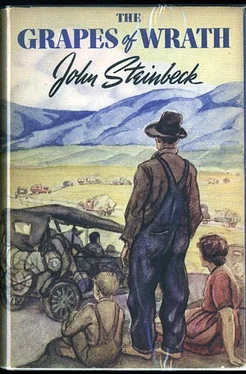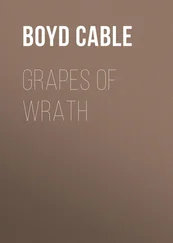John Steinbeck - The Grapes of Wrath
Здесь есть возможность читать онлайн «John Steinbeck - The Grapes of Wrath» весь текст электронной книги совершенно бесплатно (целиком полную версию без сокращений). В некоторых случаях можно слушать аудио, скачать через торрент в формате fb2 и присутствует краткое содержание. Город: New York, Год выпуска: 1939, Издательство: The Viking Press-James Lloyd, Жанр: Классическая проза, на английском языке. Описание произведения, (предисловие) а так же отзывы посетителей доступны на портале библиотеки ЛибКат.
- Название:The Grapes of Wrath
- Автор:
- Издательство:The Viking Press-James Lloyd
- Жанр:
- Год:1939
- Город:New York
- ISBN:нет данных
- Рейтинг книги:5 / 5. Голосов: 1
-
Избранное:Добавить в избранное
- Отзывы:
-
Ваша оценка:
- 100
- 1
- 2
- 3
- 4
- 5
The Grapes of Wrath: краткое содержание, описание и аннотация
Предлагаем к чтению аннотацию, описание, краткое содержание или предисловие (зависит от того, что написал сам автор книги «The Grapes of Wrath»). Если вы не нашли необходимую информацию о книге — напишите в комментариях, мы постараемся отыскать её.
The Grapes of Wrath — читать онлайн бесплатно полную книгу (весь текст) целиком
Ниже представлен текст книги, разбитый по страницам. Система сохранения места последней прочитанной страницы, позволяет с удобством читать онлайн бесплатно книгу «The Grapes of Wrath», без необходимости каждый раз заново искать на чём Вы остановились. Поставьте закладку, и сможете в любой момент перейти на страницу, на которой закончили чтение.
Интервал:
Закладка:
Tom took it from her and tasted it. “Don’t taste bad,” he said. “Make up a cup a black coffee, good an’ strong. Le’s see—says one teaspoon. Better put in a lot, coupla tablespoons.”
Ma opened the stove and put a kettle inside, down next to the coals, and she measured water and coffee into it. “Have to give it to ’im in a can,” she said. “We got the cups all packed.”
Tom and his father went back outside. “Fella got a right to say what he’s gonna do. Say, who’s eatin’ spareribs?” said Grampa. “We’ve et,” said Tom. “Ma’s fixin’ you a cup a coffee an’ some pork.”
He went into the house, and he drank his coffee and ate his pork. The group outside in the growing dawn watched him quietly, through the door. They saw him yawn and sway, and they saw him put his arms on the table and rest his head on his arms and go to sleep.
“He was tar’d anyways,” said Tom. “Leave him be.”
Now they were ready. Granma, giddy and vague, saying, “What’s all this? What you doin’ now, so early?” But she was dressed and agreeable. And Ruthie and Winfield were awake, but quiet with the pressure of tiredness and still half dreaming. The light was sifting rapidly over the land. And the movement of the family stopped. They stood about, reluctant to make the first active move to go. They were afraid, now that the time had come—afraid in the same way Grampa was afraid. They saw the shed take shape against the light, and they saw the lanterns pale until they no longer cast their circles of yellow light. The stars went out, few by few, toward the west. And still the family stood about like dream walkers, their eyes focused panoramically, seeing no detail, but the whole dawn, the whole land, the whole texture of the country at once.
Only Muley Graves prowled about restlessly, looking through the bars into the truck, thumping the spare tires hung on the back of the truck. And at last Muley approached Tom. “You goin’ over the State line?” he asked. “You gonna break your parole?”
And Tom shook himself free of the numbness. “Jesus Christ, it’s near sunrise,” he said loudly. “We got to get goin’.” And the others came out of their numbness and moved toward the truck.
“Come on,” Tom said. “Le’s get Grampa on.” Pa and Uncle John and Tom and Al went into the kitchen where Grampa slept, his forehead down on his arms, and a line of drying coffee on the table. They took him under the elbows and lifted him to his feet, and he grumbled and cursed thickly, like a drunken man. Out the door they boosted him, and when they came to the truck Tom and Al climbed up, and leaning over, hooked their hands under his arms and lifted him gently up, and laid him on top of the load. Al untied the tarpaulin, and they rolled him under and put a box under the tarp beside him, so that the weight of the heavy canvas would not be upon him.
“I got to get that ridge pole fixed,” Al said. “Do her tonight when we stop.” Grampa grunted and fought weakly against awakening, and when he was finally settled he went deeply to sleep again.
Pa said, “Ma, you an’ Granma set in with Al for a while. We’ll change aroun’ so it’s easier, but you start out that way.” They got into the cab, and then the rest swarmed up on top of the load, Connie and Rose of Sharon, Pa and Uncle John, Ruthie and Winfield, Tom and the preacher. Noah stood on the ground, looking up at the great load of them sitting on top of the truck.
Al walked around, looking underneath at the springs. “Holy Jesus,” he said, “them springs is flat as hell. Lucky I blocked under’ em.” Noah said, “How about the dogs, Pa?”
“I forgot the dogs,” Pa said. He whistled shrilly, and one bouncing dog ran in, but only one. Noah caught him and threw him up on the top, where he sat rigid and shivering at the height. “Got to leave the other two,” Pa called. “Muley, will you look after ’em some? See they don’t starve?”
“Yeah,” said Muley. “I’ll like to have a couple dogs. Yeah! I’ll take ’em.”
“Take them chickens, too,” Pa said.
Al got into the driver’s seat. The starter whirred and caught, and whirred again. And then the loose roar of the six cylinders and a blue smoke behind. “So long, Muley,” Al called.
And the family called, “Good-by, Muley.”
Al slipped in the low gear and let in the clutch. The truck shuddered and strained across the yard. And the second gear took hold. They crawled up the hill, and the red dust arose about them. “Chr-ist, what a load!” said Al. “We ain’t makin’ no time on this trip.”
Ma tried to look back, but the body of the load cut off her view. She straightened her head and peered straight ahead along the dirt road. And a great weariness was in her eyes.
The people on top of the load did look back. They saw the house and the barn and a little smoke still rising from the chimney. They saw the windows reddening under the first color of the sun. They saw Muley standing forlornly in the dooryard looking after them. And then the hill cut them off. The cotton fields lined the road. And the truck crawled slowly through the dust toward the highway and the west.
CHAPTER 11
THE HOUSES WERE LEFT vacant on the land, and the land was vacant because of this. Only the tractor sheds of corrugated iron, silver and gleaming, were alive; and they were alive with metal and gasoline and oil, the disks of the plows shining. The tractors had lights shining, for there is no day and night for a tractor and the disks turn the earth in the darkness and they glitter in the daylight. And when a horse stops work and goes into the barn there is a life and a vitality left, there is a breathing and a warmth, and the feet shift on the straw, and the jaws clamp on the hay, and the ears and the eyes are alive. There is a warmth of life in the barn, and the heat and smell of life. But when the motor of a tractor stops, it is as dead as the ore it came from. The heat goes out of it like the living heat that leaves a corpse. Then the corrugated iron doors are closed and the tractor man drives home to town, perhaps twenty miles away, and he need not come back for weeks or months, for the tractor is dead. And this is easy and efficient. So easy that the wonder goes out of work, so efficient that the wonder goes out of land and the working of it, and with the wonder the deep understanding and the relation. And in the tractor man there grows the contempt that comes only to a stranger who has little understanding and no relation. For nitrates are not the land, nor phosphates; and the length of fiber in the cotton is not the land. Carbon is not a man, nor salt nor water nor calcium. He is all these, but he is much more, much more; and the land is so much more than its analysis. The man who is more than his chemistry, walking on the earth, turning his plow point for a stone, dropping his handles to slide over an outcropping, kneeling in the earth to eat his lunch; that man who is more than his elements knows the land that is more than its analysis. But the machine man, driving a dead tractor on land he does not know and love, understands only chemistry; and he is contemptuous of the land and of himself. When the corrugated iron doors are shut, he goes home, and his home is not the land.
THE DOORS of the empty houses swung open, and drifted back and forth in the wind. Bands of little boys came out from the towns to break the windows and to pick over the debris, looking for treasures. And here’s a knife with half the blade gone. That’s a good thing. And—smells like a rat died here. And look what Whitey wrote on the wall. He wrote that in the toilet in school, too, an’ teacher made ’im wash it off.
When the folks first left, and the evening of the first day came, the hunting cats slouched in from the fields and mewed on the porch. And when no one came out, the cats crept through the open doors and walked mewing through the empty rooms. And then they went back to the fields and were wild cats from then on, hunting gophers and field mice, and sleeping in ditches in the daytime. When the night came, the bats, which had stopped at the doors for fear of light, swooped into the houses and sailed through the empty rooms, and in a little while they stayed in dark room corners during the day, folded their wings high, and hung head-down among the rafters, and the smell of their droppings was in the empty houses.
Читать дальшеИнтервал:
Закладка:
Похожие книги на «The Grapes of Wrath»
Представляем Вашему вниманию похожие книги на «The Grapes of Wrath» списком для выбора. Мы отобрали схожую по названию и смыслу литературу в надежде предоставить читателям больше вариантов отыскать новые, интересные, ещё непрочитанные произведения.
Обсуждение, отзывы о книге «The Grapes of Wrath» и просто собственные мнения читателей. Оставьте ваши комментарии, напишите, что Вы думаете о произведении, его смысле или главных героях. Укажите что конкретно понравилось, а что нет, и почему Вы так считаете.











